nones
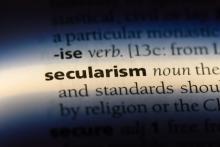
Some years ago, I was supervising a focus group of nonreligious Latinxs. The topic of the focus group was politics and religion. As the discussion progressed, someone meekly mentioned that they were not religious, apparently expecting the judgment of their fellow group members. But they were not judged. One by one, fellow group members surprised each other as they admitted that they were also not religious. They were unaware that there were others like them. Their experiences have been ignored by their ethnic communities and society at large because they do not fit the stereotype of the pious Latinx. Nevertheless, it’s important for religious people and the broader public to understand this particular group.

Pew Research just released results of a major survey on why Americans go, and don’t go, to church today. Not surprisingly, the number of those attending religious services regularly is declining, with numbers of younger people the highest. But among these, there is a surprise: Of those who cite a reason other than lack of belief for not attending, 70 percent say that religion is important in their lives. When asked why they do not regularly attend religious services, the most frequently cited reason is this: “I practice my faith in other ways.” That’s what intrigues me about the Camino.
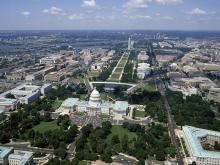
Members of the U.S. House of Representatives and organizations promoting atheism, agnosticism, and humanism announced the creation this week of the first Congressional Freethought Caucus.
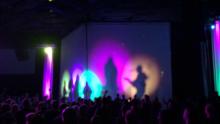
IT’S A WEDNESDAY night in early November and the sanctuary of Redemption Church in Olathe, Kan., is full. The audience, mostly 20- and 30-somethings, is listening in rapt attention to Mike McHargue, better known as Science Mike. Self-proclaimed science enthusiast McHargue, co-host (with musician and songwriter Michael Gungor) of The Liturgists Podcast, is doing a live episode of his solo side podcast, Ask Science Mike, as part of a tour for his new book, Finding God in the Waves.
After questions ranging from the neurological effect of belief on the brain to the role of women in the church, a young man stands and shares his story. He works at a conservative church, he says, and finds his beliefs are starting to differ from the people he works with. Finally, he asks, “When you start to ask big questions, and you don’t know where they’re going, and you don’t know where they’ll take you, how do you find the courage to continue to move forward when you know it might have dramatic consequences?”
“I have terrible news,” McHargue answers. “If this continues, you will not fit in where you are. How do I know? There are a thousand people at a Baptist church, who I love dearly, who could not stand to be in a room with me, because I’m the one who rebelled against the tribe.” He pauses a moment before continuing. “Here’s the other thing. This is good. The way you understood God, that served you for so long, isn’t working anymore because you’re growing. ... So I say, get excited.”
McHargue and his Liturgists Podcast co-host Gungor are no strangers to questions about belief, doubt, and straying from the theological tribe. Both men grew up in conservative evangelical churches, and both men lost their faith as adults, regaining it in a different form later on. It’s an experience familiar to plenty of the millennials and Gen-Xers who make up the “nones,” the growing portion of the U.S. population who have no religious affiliation.
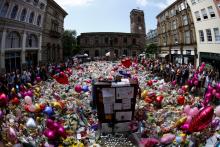
A week after a terrorist bomb killed more than 20 and left scores injured, the people of Manchester will make their way through the streets of their grief-stricken city in one of its most traditional and religious events: the Whit Walk.
This will be a moment where the old Manchester meets the new, when the Christian tradition of the walk, commemorating the Feast of Whitsun — or Holy Trinity — meets the secular rituals that have come to define public mourning since this increasingly irreligious nation said goodbye to Princess Diana, who died exactly 20 years ago.

I recently had a conversation with a woman who used to be a church-goer when she was young, but hasn't found herself in a church setting in a while. When I told her I lead worship at a nearby church, she was interested in coming to visit. We in the church have theories about where we go wrong in bringing new faces into our buildings. Out in the world people go about their everyday lives, and we watch to see if they are a part of the church or outside of it.

A quarter of U.S. adults do not affiliate with any religion, a new study shows — an all-time high in a nation where large swaths of Americans are losing faith.
But while these so-called “nones” outnumber any religious denomination, they are not voting as a bloc, and may have little collective influence on the upcoming presidential election.
The rapid growth of the religiously unaffiliated, charted in a survey released by the Public Religion Research Institute on Sept. 22, is raising eyebrows even among those who follow trends in American religiosity.
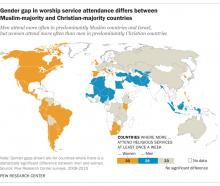
Fewer men than women show up in U.S. churches, and women are markedly more likely to pray and to hold up religion as important. But in Muslim nations, it’s the women who are missing in action at the mosque — and yet they’re on par with men in upholding almost all the Muslim pillars of faith.
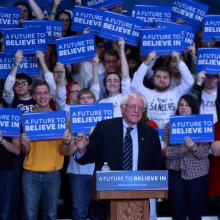
Bernie Sanders’ primary victory in the Granite State Feb. 9 made him the first-ever non-Christian to win a presidential primary in U.S. history. In addition, depending on whether you count Barry Goldwater as Jewish (his ancestors were Jewish but he identified as Episcopalian), Bernie Sanders could be considered the first Jewish primary winner in history as well.

The run-up to the Feb. 1 Iowa caucus has shifted from who is toughest on ISIS or immigration or Obamacare to an all-out scramble to court evangelicals — an estimated 60 percent of Republican caucus likely voters. However, a new report from the Public Religion Research Institute shows that evangelicals may be sharing their November election clout with a different voting bloc. PRRI found about one in four Iowans identify as evangelical but a similar percentage say they have no religious identity, the nones.
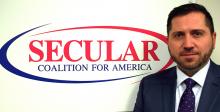
The Secular Coalition for America, a lobbying group with atheist, humanist and other nonbeliever member organizations, has hired a Christian as its new executive director. Larry Decker, 40, was raised in an independent Baptist church but now identifies as a “none” — one of the 23 percent of Americans who say they are religiously unaffiliated, according to the Pew Research Center. Like the majority of nones, Decker is not an atheist; he still identifies as a Christian, albeit a nominal one.
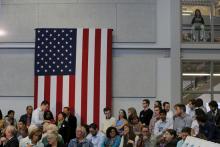
Political candidates are facing a new reality: Within the Democratic coalition, there are more religiously unaffiliated voters than belong to any single religious group.
This is a significant change in American politics, where nonbelief has long been a liability.
Survey data show that Americans with no religious affiliation are a growing share of both major political parties. But the trend is particularly strong within the Democratic coalition, where the unaffiliated now represent 28 percent of those voters, according to a new Pew Research study.

Americans as a whole are growing less religious, but those who still consider themselves to belong to a religion are, on average, just as committed to their faiths as they were in the past — in certain respects even more so.
The 2014 U.S. Religious Landscape Study, released Nov. 3 by the Pew Research Center, also shows that nearly all major religious groups have become more accepting of homosexuality since the first landscape study in 2007.
The new study may provide some solace to those who bemoan the undeniable rise in America of the “nones” — people who claim no religious affiliation.
“People who say they have a religion — which is still the vast majority of the population — show no discernible dip in levels of observance,” said Alan Cooperman, director of religion research at Pew.
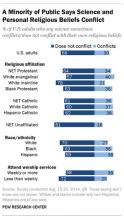
Most Americans see a conflict between the findings of science and the teachings of religion.
But “see” is the operative word in a new Pew Research Center report issued Oct. 22.
Examining perceptions leads to some unexpected findings.
While 59 percent of U.S. adults say they saw science and religion in conflict, that drops to 30 percent when people are asked about their own religious beliefs.
It turns out that the most highly religious were least likely to see conflict.
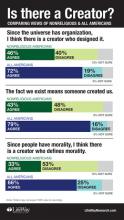
You don’t have to believe in God or identify with any religion to see a creator’s hand in human life and morality, suggests a new survey.
LifeWay Research’s overall finding — that most Americans believe there is a creator who designed the universe and defines human morality — is not surprising. After all, 3 in 4 U.S. adults identify with a religious denomination.
The surprise is that so many people who don’t identify with a religion — so-called nones — agree.

As an undergraduate student at a Christian university, I realize that my degree of experience within American social trends is limited to the last two decades. However, my age does not disqualify my faith as a Christian, nor should my faith as a Christian disqualify my faculty of reasoning.
I cannot speak as one who knows the mind of God, but as a Christian I have been called to have the mind of Christ. And through careful inspection of the texts left for us, it is possible to discern what a Christ-like mind is — what a Christian mind is supposed to be.

The findings show that as many as 45 percent of Americans will look at the church brand on the sign out front — Catholic or Baptist or Methodist or whatever — and drive past, thinking it is “not for me.”
And yet, McConnell said, the survey reveals an openness in most people — if not a very theologically deep one — to stopping by, even if they declare no religious identity, the “nones.”
“Many people view a church like the ice cream parlor down the road. They think, ‘When I’m in the mood, I can go.’ Church leaders can take it as good news: People haven’t ruled them out. But they have to be a little unsettled at how little people are thinking about this,” said McConnell.
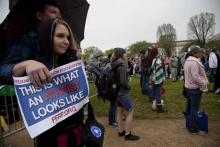
As the 2016 election approaches, atheist, humanist, and other freethinking activists are encouraged. They say their longtime goal of creating a cohesive and formidable secular voting bloc from the diverse and scattered category of the nonreligious has taken new life from the study — and could carry them far if they use the data wisely.
“It is going to translate into a lot of political clout and social acceptance if we manage this correctly,” said David Silverman, president of American Atheists.

The rising number of people choosing “nothing in particular,“ a subset of the "unaffiliated” label, has raised hackles across the theo-political spectrum, from some fundamentalist evangelicals decrying the de-Christianizing of the nation to more mainline Protestant handwringing over the loss of current and future members from already-struggling denominations.
The problem with this range of views (as far as I’ve read) is that, while certainly broad, it’s pretty shallow. There’s nuance to the “nones.” I can say this with confidence as someone who has drifted across the borders of that category once or twice or every other day. While there are certainly those in the group who don’t care about religion, there are also those with complicated feelings. These are people who still see their lives, maybe all life around them, as uniquely religious. Many have even done the work to interpret such complicated feelings, which is no small task.
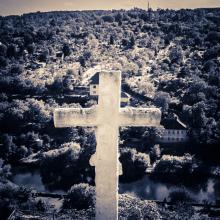
It’s important to listen to the stories told through the numbers as well as the untold stories. As a non-American, it is surprising to hear my brothers and sisters throw out phrases like, “the church is in decline,” when what you are referring to is the church in America. The global church is alive and well and thriving in many areas of the world, and what joy it would be to allow their voices to speak into the congregations of the global North. Many of the polarizing, divisive issues in the American church, such as gay marriage, abortion, and the death penalty, are being discussed by the global church outside the context of the binary lenses of the American left and right. These outside voices can serve to soften the rhetoric hurled by each side, and also give perspective to the priority placed on them in light of the problems faced by the global South.